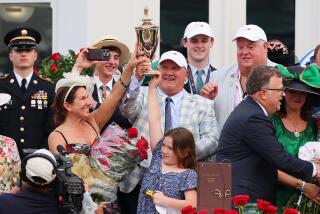White Thoroughbred is Rarity--and She Can Run
- Share via
FLORENCE, Ky. — The red leg wraps are just about all that keep Patchen Beauty from blending into the white fence background as she works on the Turfway Park backstretch.
She is the rarest of race horses, a white thoroughbred, the only one in training in the world. And, maybe, she’s a runner.
“She’s no novelty. I can’t afford them,” said trainer Ralph Christenson, who conditions a modest string of 12 horses. “I’ve got to come up with a good horse every once in a while just to break even.”
The 65-year-old Christenson was a cowboy in Arizona and an outrider in California before he got his first trainer license in 1960. He has raced from Delaware to Del Mar, and most places in between.
So, he’s been around long enough to recognize talent--and he believes Patchen Beauty has some.
“Everybody told me she can’t run,” Christenson said. “I think she’s a good filly. I don’t see any reason why she can’t be a real good filly.”
Patchen Beauty has been a slow learner. She flopped as a 2-year-old at Churchill Downs, showed some promise last year at Keeneland and finally broke her maiden at Turfway in December, in her eighth start.
“People underestimate her because she’s white,” Christenson said. “But she’s a very gutty horse.”
Patchen Beauty is the daughter of Precious Beauty and great-granddaughter of White Beauty, the first of only nine white thoroughbreds ever registered with the Jockey Club.
She gets her last name from her lineage and her first from her home, Patchen Wilkes Farm, owned by Warren Rosenthal.
When White Beauty was foaled in 1963, the Jockey Club didn’t consider her a thoroughbred. At that time, the accepted colors for thoroughbreds were bay, brown, dark brown, black, chestnut, gray and roan.
“There is a very strong recessive gene that runs through this family from White Beauty,” Rosenthal said. “It is amazing that after this many generations you still see a white horse pop up.”
It took three tries for Rosenthal and his farm manager, Barry Ezrine, to carry on the white line. Precious Beauty’s first foal was a roan, the second a dark bay.
Patchen Beauty was the result of a pairing with Hatchet Man, a gray that won 10 of 32 races and earned about $359,000. Because of Hatchet Man’s breeding, Christenson believes Patchen Beauty’s future is on the turf.
“I’ll get her on the grass and you will see a good filly. Now, that’s sticking your neck out,” Christenson said.
His daughter, Jackie, feeds, brushes and cleans up after Patchen Beauty. It was she who persuaded Ezrine to give Patchen Beauty to her father to train.
“It was a feat just to get her to the races,” Ezrine said. “The win was an added bonus.”
Whenever she races, Patchen Beauty draws a crowd in the paddock. She’s such a curiosity that she has her own fan club home page on the Internet.
“She loves people. A lot of horses that are exposed to that much publicity get nervous. When she sees a camera, she stops and poses,” Christenson said.
Indeed, Coronado’s Quest was such a basket case he was held out of last year’s Triple Crown series before settling down and winning some big races.
White thoroughbreds have not been distinguished runners. White Beauty won only once, and Precious Beauty not at all.
“Anything she does on the track would be a plus,” Rosenthal said. “Now that she’s broken her maiden, if she goes on to do anything else we’d just be delighted.”
Rosenthal hopes Christenson is right about Patchen Beauty’s potential on grass. She’s being pointed toward a turf race at Keeneland in April.
“After that, it all depends on what she can do. She doesn’t need to be the biggest stakes winner in the world to make us happy,” Rosenthal said. “Maybe she’ll be a late bloomer and run well at 4 and 5. If not, we’ll bring her home.
“We aren’t expecting a lot--surprise is better than disappointment. We’ll be happy if she stays strong and healthy and shows the heart to run.”
As good-natured as she is, Patchen Beauty won’t be treated as if she’s a pet at Patchen Wilkes Farm, the way Sonny and Carolyn Hine treated their beloved Skip Away.
“She gets an awful lot of attention, but the worst thing you could do is try to make a pet out of her. She needs to be a horse,” Rosenthal said.
More to Read
Sign up for The Wild
We’ll help you find the best places to hike, bike and run, as well as the perfect silent spots for meditation and yoga.
You may occasionally receive promotional content from the Los Angeles Times.






